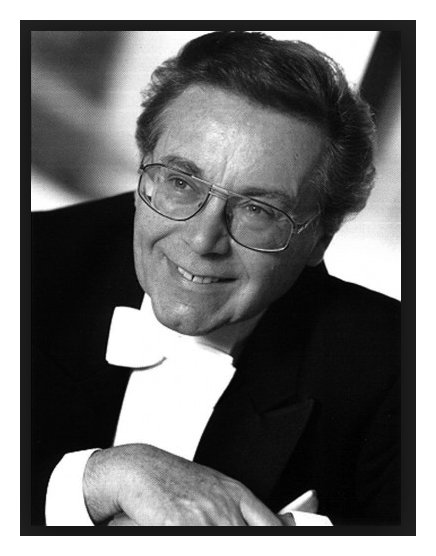

Born: July 29, 1935 - Meissen, Germany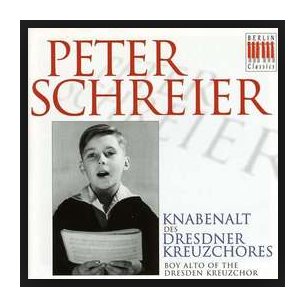 The highly esteemed German tenor and conductor, Peter (Max) Schreier, was
a son of a Church Kantor, who gave him his first musical training. At the
age of eight Peter was entered in the preparatory class of the Dresdner Kreuzchor,
to which he belonged for many years. He made his first operatic appearance
as one of the Three Boys in Mozart's Die
Zauberflöte in 1944, which led him to consider a musical career.
At the age of ten he started as a soprano but they discovered rapidly that
he was an alto. Soon he rose to the position of first alto soloist within
the choir. Even as a boy chorister, Schreier was entrusted with many solo
parts. As such he sang on some of the first German LP’s ever released of
Bach cantatas. He traveled to France, Scandinavia, and Luxembourg, among
other destinations, on tour with the Dresdner Kreuzchor.
The highly esteemed German tenor and conductor, Peter (Max) Schreier, was
a son of a Church Kantor, who gave him his first musical training. At the
age of eight Peter was entered in the preparatory class of the Dresdner Kreuzchor,
to which he belonged for many years. He made his first operatic appearance
as one of the Three Boys in Mozart's Die
Zauberflöte in 1944, which led him to consider a musical career.
At the age of ten he started as a soprano but they discovered rapidly that
he was an alto. Soon he rose to the position of first alto soloist within
the choir. Even as a boy chorister, Schreier was entrusted with many solo
parts. As such he sang on some of the first German LP’s ever released of
Bach cantatas. He traveled to France, Scandinavia, and Luxembourg, among
other destinations, on tour with the Dresdner Kreuzchor.He remained with the choir as a tenor after his voice changed. In 1954, he began taking private voice lessons with the well-known Leipzig concert singer and singing pedagogue Fritz Polster (1954-1956), while working as a member of the Leipzig Radio Chorus. In 1956, he entered the Dresden Musikhochschule (Carl Maria von Weber College Music), where his teacher was Winkler. Schreier studied both singing and conducting. He also studied at the Dresden State Opera's training school. In 1957, where he appeared in the opera studio's production of Il matrimonio segreto as Paolino. He graduated from the Musikhochschule in 1959, passing the State Exam. Schreier joined the Dresden State Opera's company as a lyric tenor, making his official operatic debut there as the First Prisoner in Fidelio in 1959. He became a regular member of the company in 1961. During those years he made a concert tour to India and the African nation of Mali. He sang a guest appearance at the Berlin State Opera and in 1963 gained a contract with that company as its leading lyric tenor. He made numerous guest appearances in the Soviet Union and other countries of what was then known as the Eastern Bloc, and appeared fairly often in the West. He made his bow in Vienna in 1966 and at the Salzburg Festival one year later, singing Tamino each time. He appeared for the first time in London in 1966 (debut as Ferrando with the visiting Hamburg State Opera), and at the Metropolitan Opera in New York in 1967 (debut as Tamino). There followed his first appearances at the Bayreuth Festival, the Vienna State Opera (1967), La Scala in Milan (1968) and the Teatro Colón in Buenos Aires (1969). Schreier quickly won acclaim in particular for his portrayals of Mozart's main tenor roles, and as a recitalist. He was also highly praised for roles as diverse as Alfred in Die Fledermaus and Loge in Das Rheingold, and appeared in the premiere of Paul Dessau's Einstein as the Physicist. He also sang the role of Almaviva in Rossini's Il barbiere di Siviglia, Fenton in Verdi's Falstaff, and Lensky in Tchaikovsky's Eugene Onegin. His keen interest in the oratorio has earned him an international reputation as a concert singer. Schreier has set standards in the interpretation of Bach’s Oratorios, Passions and Cantatas, notably the parts of the Evangelists. He has also won acclaim as a performer of the Lied. His Schubert was especially regarded for its highly expressive projection and shaping of the words. Over the years he has made many recordings as singer and conductor (and sometimes both together), often singing a role more than once on different labels. In 1970, he took up the other side of his career, conducting for the first time at a concert with the Dresden Staatskapelle. Since then he has emerged as a leading Bach and Mozart conductor. 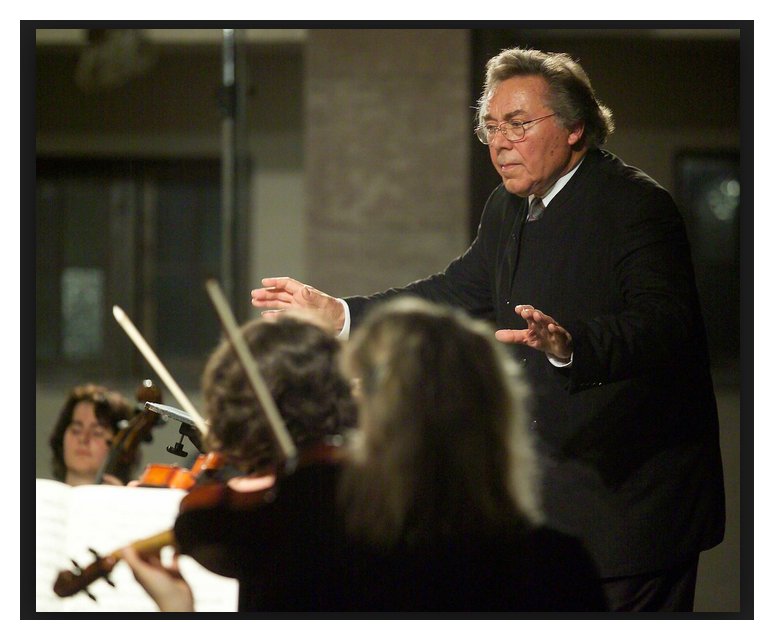
Peter Schreier finished his singing career in December 2005, combining the roles of Evangelist and conductor in a performance of Bach's Christmas Oratorio (BWV 248) in Prague. He continues his work as a conductor. Peter Schreier received numerous honours, including the National Prize (First Class) of the German Democratic Republic, the Salzburg Mozarteum's Silver Mozart Medal, and the title of Kammersänger (1964). In 1986 he was appointed an honorary member of the Vienna Gesellschaft der Musikfreunde, the Anderson-Nexö Prize of the City of Dresden, and the Ernst von Siemens Foundation Prize. He published the book Aus meiner Sicht: Gedanken und Erinnerungen (edited by M. Meier, Vienna, 1983). In 2005 appeared In Rückspiegel (Vienna, also edited by M. Meier). -- Text (only) edited and corrected
from a bio on the Bach Cantatas website. Photos from other sources.
|
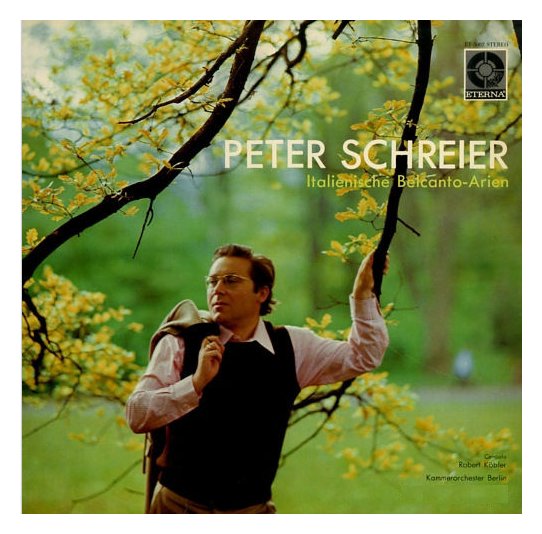 Bruce Duffie:
You are a performer of Lieder, oratorio,
and opera, and now you also conduct. How do you arrange your schedule
to accommodate all of this?
Bruce Duffie:
You are a performer of Lieder, oratorio,
and opera, and now you also conduct. How do you arrange your schedule
to accommodate all of this?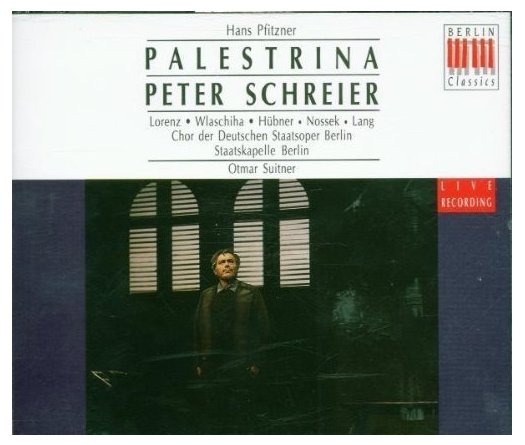 BD: Palestrina [in the opera by Pfitzner]?
BD: Palestrina [in the opera by Pfitzner]?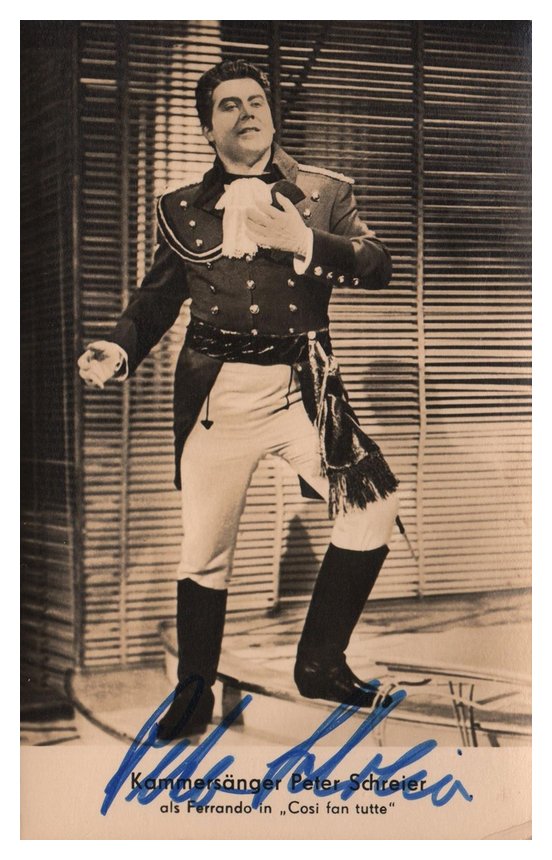 PS:
That's a very good question! Mozart says he goes back to his intended
lady, and the music is composed in that way. You cannot change the music.
I did it at La Scala in the Pizzi production, and he wanted us to stay with
the new women and not go back. But the music doesn't allow that, really.
PS:
That's a very good question! Mozart says he goes back to his intended
lady, and the music is composed in that way. You cannot change the music.
I did it at La Scala in the Pizzi production, and he wanted us to stay with
the new women and not go back. But the music doesn't allow that, really.
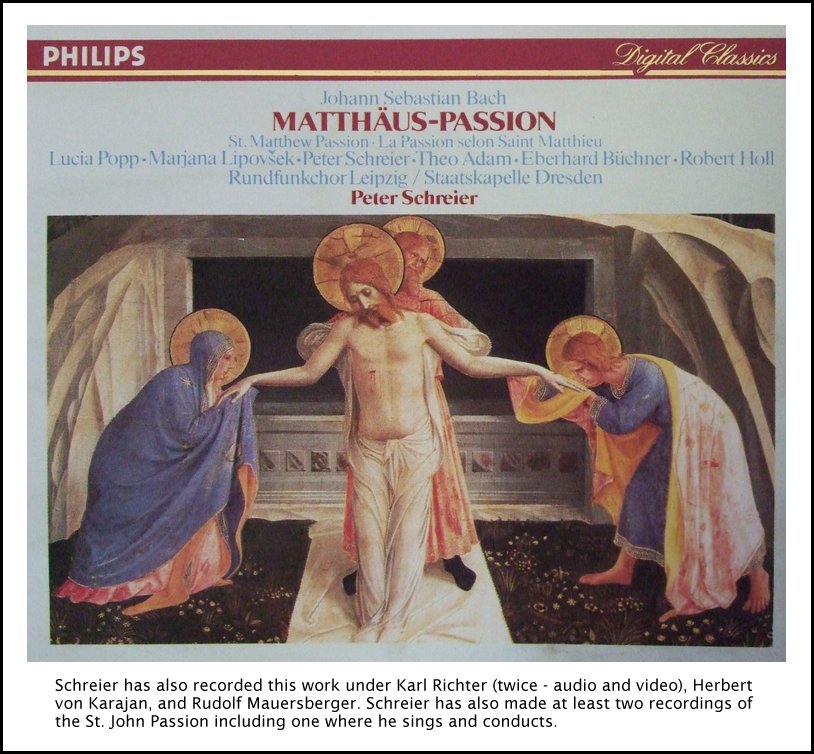
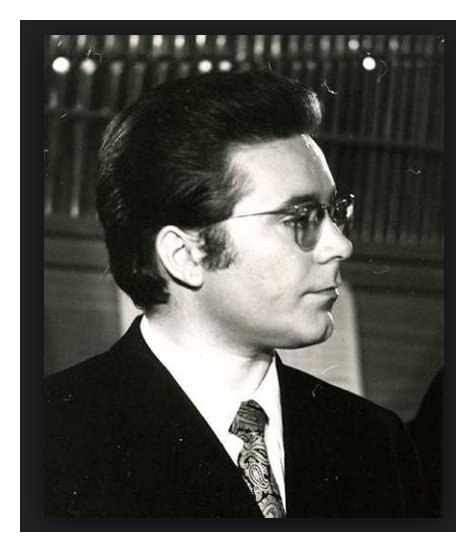 PS:
No, not at all. It is the substance of voice. One has to have
a good voice. One has to know and understand the instrumental style
of Bach in particular and the entire period of the Baroque. Bach treats
the voice like an orchestral instrument.
PS:
No, not at all. It is the substance of voice. One has to have
a good voice. One has to know and understand the instrumental style
of Bach in particular and the entire period of the Baroque. Bach treats
the voice like an orchestral instrument. |
A bit about Vogl from two different sources...
Johann Michael Vogl (August 10, 1768 – November 19, 1840), was an Austrian baritone singer and composer. Though famous in his day, he is remembered mainly for his close professional relationship and friendship with composer Franz Schubert. 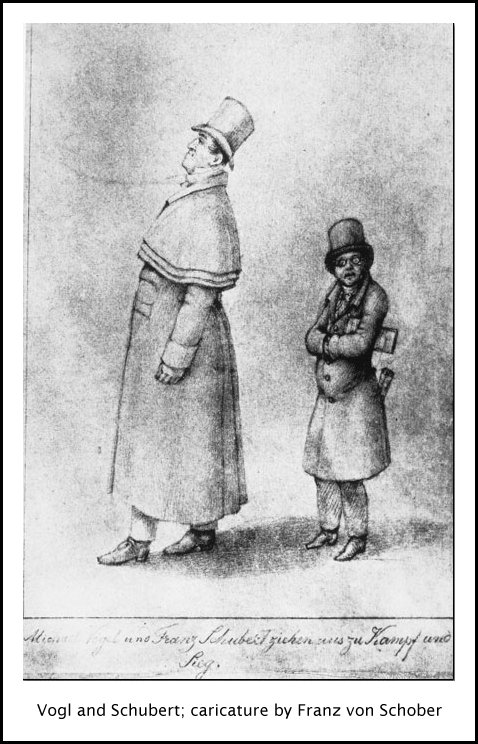 Vogl was born in Steyr. As a young man he enrolled at the Gymnasium at Kremsmünster,
where he studied languages, philosophy, and sang in several musical productions
by his friend Franz Süßmayr (the same man who completed Mozart's
Requiem). In 1786 Vogl went
to Vienna to study, and later to practice law. In 1795 he debuted at the Vienna
Hofoper, and quickly attracted a following for both his acting capability
and the beauty of his voice.
Vogl was born in Steyr. As a young man he enrolled at the Gymnasium at Kremsmünster,
where he studied languages, philosophy, and sang in several musical productions
by his friend Franz Süßmayr (the same man who completed Mozart's
Requiem). In 1786 Vogl went
to Vienna to study, and later to practice law. In 1795 he debuted at the Vienna
Hofoper, and quickly attracted a following for both his acting capability
and the beauty of his voice.In 1813, Franz Schubert attended a performance of Gluck's Iphigénie en Tauride in which Vogl sang the role of Orestes. Schubert never forgot the experience and determined to write for Vogl. The following year, when Vogl sang the role of Pizarro at the premiere of the final version of Beethoven's Fidelio, it is said that the 17-year-old Schubert actually sold his schoolbooks in order to afford a ticket. When composer and singer finally met, in 1817, Vogl was as impressed with the quality of Schubert's music as Schubert was with Vogl's singing. Schubert wrote many of his subsequent songs with Vogl in mind. One of their early successes was an 1821 performance of Der Erlkönig, prior to its publication and to significant popular acclaim. Vogl continued to sing Schubert's music after the death of his friend in 1828, famously singing a complete performance of Winterreise accompanied by the pianist Emanuel Mikschik shortly before his own death on the twelfth anniversary of the death of his friend. He died in Vienna. == == == ==
== == == == == == ==
One might imagine that a copy of the sheet music to Die schöne Müllerin would be a simple enough matter. A detail-oriented person would make a beeline for the Urtext edition, but it turns out that this search is not quite so simple. The autograph manuscript is lost, except for Eifersucht und Stolz, so there is no way to know for certain what Schubert's final intentions were with every last word and note in the score. Schubert was out of town and unable to return to Vienna to do proofreading when Sauer & Leidesdorf prepared the first printed edition in 1824. As a result, a number of typographical errors and mistakes slipped through in this first edition. A second edition was published in 1830 by Anton Diabelli in Vienna. This edition came out two years after Schubert's death, and the composer almost certainly had no input into this set. Moreover, the Diabelli edition has a number of significant changes from the Sauer & Leidesdorf edition, probably a result of the intervention of Schubert's singing partner, baritone Johann Michael Vogl. Some songs are transposed down and some of the trickier lines are smoothed out, perhaps to better suit Vogl's aging voice. Some of the changes, including the wholesale addition of measures in Eifersucht und Stolz and unusual ornamentations probably reflect Vogl's personal tastes. |
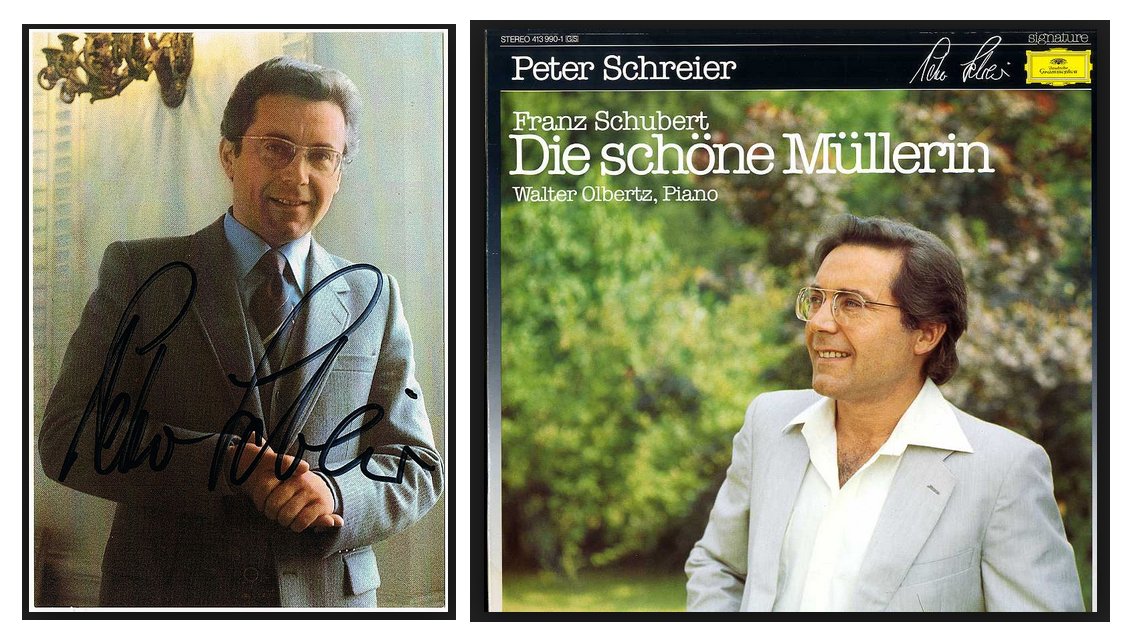
© 1997 Bruce Duffie
This conversation was recorded at his hotel in Chicago on March 10,
1997. Portions were broadcast on WNIB in 2000, and on WNUR in 2004.
This transcription was made in 2016, and posted on this website at that time.
To see a full list (with links) of interviews which have been transcribed and posted on this website, click here. To read my thoughts on editing these interviews for print, as well as a few other interesting observations, click here.
Award - winning broadcaster Bruce Duffie was with WNIB, Classical 97 in Chicago from 1975 until its final moment as a classical station in February of 2001. His interviews have also appeared in various magazines and journals since 1980, and he now continues his broadcast series on WNUR-FM, as well as on Contemporary Classical Internet Radio.
You are invited to visit his website for more information about his work, including selected transcripts of other interviews, plus a full list of his guests. He would also like to call your attention to the photos and information about his grandfather, who was a pioneer in the automotive field more than a century ago. You may also send him E-Mail with comments, questions and suggestions.